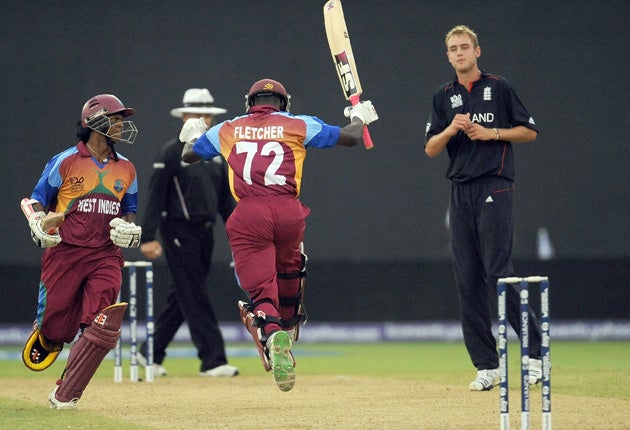Rain dampens England's spirits to set up knockout tie with Irish
England 191-5 West Indies 6

For the second time in 10 months, the West Indies cut deeply into England's World Twenty20 ambitions. Last summer the wound was terminal, here last night it may prove to have been no more than an irritating scratch.
But it increases dramatically the need for England to salve it by beating Ireland in their second group match today – and the Guyanese weather is once more likely to be unaccommodating. England lost their opening match of the tournament under the unsatisfactory but stringently fair Duckworth-Lewis method off the penultimate ball of the shortened match.
The home fans cared not a jot that it might have been an artificial victory. It was a victory legitimately achieved and it saw their side through to the Super Eights stage.
England were understandably sore in the immediate aftermath. Their captain, Paul Collingwood, said: "We're very, very frustrated. Ninety-five per cent of the time 191 is enough but with D-L it wasn't – they need a different calculation." It is precisely because of DL's statistical precision that they do not need a different calculation.
Having made that total of 191 for 5, most of them corking runs, England were suddenly faced not only by a West Indies response that bristled with intent but one which was assisted by the intervention of rain. There was a typical Georgetown downpour – hot, sweaty and very wet – after only 2.2 overs of the West Indies innings by which time they were 30 for none and their captain, Chris Gayle, was in his pomp. More than an hour was lost and for most of it prospects of a resumption looked bleak.
But cricket, somewhat belatedly, has begun to assume that where there is a will there is a way and eventually it was decreed that six overs were possible in all and the West Indies had to make 60. As they already had half of them it was obvious who the favourites were.
Graeme Swann bowled the oddest of overs – he removed both Gayle, who chipped him to mid-wicket – and Kieron Pollard – who was smartly stumped by Craig Kieswetter with his foot in the air although it was over the crease – but he also conceded 13 runs.
Not even the inconstant West Indies could make a mess it from there and although both Mike Yardy and Stuart Broad bowled perfectly acceptable overs, there was not enough wriggle room for England. West Indies had officially won by eight wickets (D-L).
England, despite all, were rather magnificent. They asserted that they were ready for this tournament, a promise easily ignored given their previous in this regard.
But a brisk opening was followed by a swashbuckling second half which would not have disgraced any team anywhere. On a surface that denied all prognostications, bringing into further disrepute the dodgy art of pitch reading, they set a prodigious target.
This was supposed to be a low, slow grudging pitch yet England hit more sixes on it, 11, than they had in any previous T20 match. Two years ago in Christchurch they hit 10.
The new opening pair, Michael Lumb and Craig Kieswetter, about whom doubts had been understandably expressed, did exactly what it said on the England packet. Lumb was out in the fourth over but by then he had made 28 from 18 balls, the cavalier unafraid to take a risk. Kieswetter, deprived of the strike until the 16th ball of the innings, did not hang about either and while all his three sixes were venomous, the third, as he sashayed down the pitch, made room outside leg stump and thumped over long off, came from what is rapidly becoming a trademark stroke.
But it was Eoin Morgan, England's new go-to guy, who once more made the most decisive, spectacular contribution. The innings might have fallen on its bottom when he and Luke Wright came together at 88 for 4. Paul Collingwood had been bowled by a quicker ball from Darren Sammy, the most impressive of West Indies' septet of bowlers, Kevin Pietersen was caught in the deep trying to replicate the six he had struck the previous ball (perhaps not for the first time).
Morgan and Wright confidently regrouped. The former played his litany of outrageous strokes, all by now familiar, none of them the less pleasing to watch. He reversed, he switch-hit – to switch is to bewitch – and he pulled and straight-drove more conventionally.
Wright was less inventive, barely less effective as he scythed merrily away. They put on 95 in 56 balls, each hitting three sixes and running as fast as their legs would carry them. It was what Twenty20 cricket stands for and it was possible to feel cricketers of long ago stirring in heaven and wondering what foul calumny was being committed below. It was wonderful.
England must have thought they had enough. In Twenty20, as probably in James Bond, nothing is ever enough.
Subscribe to Independent Premium to bookmark this article
Want to bookmark your favourite articles and stories to read or reference later? Start your Independent Premium subscription today.

Join our commenting forum
Join thought-provoking conversations, follow other Independent readers and see their replies